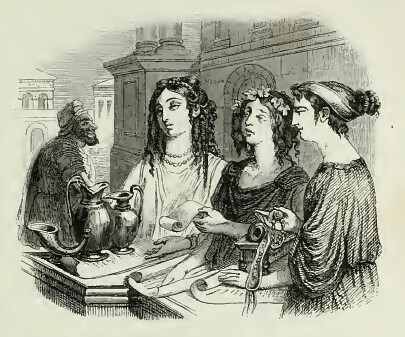That one in counsel may excel
A number, let this fable tell.
A man three daughters left behind;
One fair, whose eye to love inclin'd;
Another of a frugal nature;
The third a homely, drunken creature.
The father his estate divided
Amongst the three, and thus decided:
"That by the mother the bequest
Should be so given, that none possesst
The goods bestow'd: This done, that they
Should each the mother duly pay
A thousand pounds." The story made
Much talk in Athens. When afraid
Of doing wrong, the mother sent
For lawyers, no one could invent
So to dispose of the bequest,
That given, it should not be possesst.
After much vain deliberation,
Producing no determination,
The mother, leaving law behind,
To each what most she wish'd assign'd:
To the coquette gems, lace, brocade;
Rich farms to the industrious maid;
And of the drunken, lazy sot,
Well furnish'd cellars were the lot.
Having thus settled the donation,
With universal approbation;
Esop stept forward from the crowd,
And to the assembly cried aloud,
"O how the dead, if dead men see,
Will mock at your simplicity,
That in all Athens none remain
Who can this legacy explain!"
Ask'd his opinion, they might have,
He this interpretation gave:
"The wine-vaults and the house in town
The girl of housewifery must own;
Let her the robes and jewels share
Whose table is her only care;
Give to the beauty lands and beeves:
Thus none will keep what she receives,
But to get rid of will make haste,
Things so discordant to her taste;
The sot her gems exchange for wine;
The gay her meadows to go fine;
The house and wines the rustic give,
In rural industry to live;
Then what was given, by none possess'd,
The mother claims her due bequest."
Thus one man's judgment could explain
What Athens had explor'd in vain.
Source: Boothby - Phaedrus 4.5.

No comments:
Post a Comment